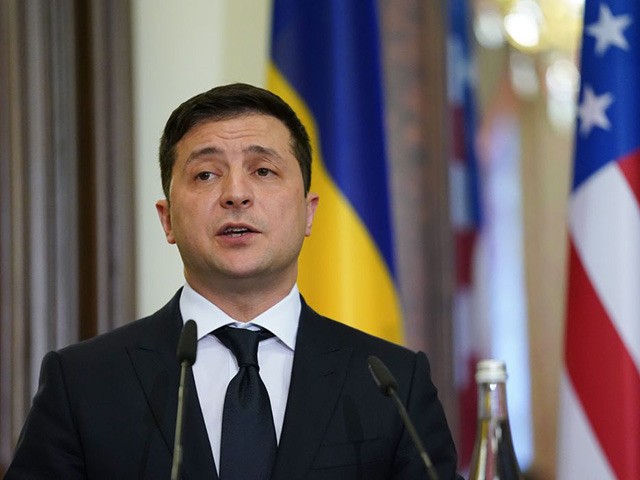The government of Ukraine quietly withdrew support for a United Nations resolution demanding China allow an investigation into its concentration camps this weekend, promoting effusive applause from Chinese state media on Monday.
The resolution, which the government of Canada presented at the Human Rights Council, boasted the signatures of over 40 countries and condemned China for its increasingly repressive communist policies in Hong Kong and Tibet.
“Credible reports indicate that over a million people have been arbitrarily detained in Xinjiang,” the statement read in part, “and that there is widespread surveillance disproportionately targeting Uyghurs and members of other minorities and restrictions on fundamental freedoms and Uyghur culture.”
“There are also reports of torture or cruel, inhuman and degrading treatment or punishment, forced sterilization, sexual and gender-based violence, and forced separation of children from their parents by authorities,” it continued. “We urge China to allow immediate, meaningful and unfettered access to Xinjiang for independent observers, including the [U.N.] High Commissioner [on Human Rights].”
As the statement notes, satellite images suggest the Chinese Communist Party has built over 1,000 concentration camps in Xinjiang, its largest and westernmost region, to house millions of people belonging to Muslim ethnic minorities, particularly the Uyghur population. Camp survivors have testified that victims are subject to indoctrination, regular gang rape and other sexual torture; and medical testing that indicates the practice of live organ harvesting.
Ukraine is a member of China’s Belt and Road Initiative (BRI), its global infrastructure debt-trap program for developing countries, and recently signed a deal with Beijing to import thousands of doses of the Communist Party’s low-efficacy coronavirus vaccines. The Associated Press (AP), citing anonymous sources, claimed the Party threatened to terminate the vaccine deal if Kyiv did not withdraw from the Xinjiang statement.
Under President Volodymyr Zelensky, despite its membership in BRI, the Ukrainian government has shown little fear of conflict with China, however, unilaterally sanctioning four Chinese companies this year for attempts to buy out a strategic military jet engine manufacturer. While remaining a public ally of the United States, Zelensky’s administration has also experienced growing tensions with President Joe Biden, who has made several moves benefiting the government of Russian leader Vladimir Putin including refusing to sanction Russia’s Nordstream 2 European gas pipeline and extending the New START nuclear proliferation treaty. Biden has also publicly insulted Ukraine as too corrupt to be allowed into the NATO military alliance, without addressing allegations of his own family’s questionable deals with Ukrainian oligarchs.
Reports indicated this month that, after meeting with Putin personally — and turning down an urgent demand from Zelensky for an in-person meeting prior to the Putin summit — Biden froze $100 million in lethal aid to Ukraine. Ukraine has endured nearly a decade of civil war in its eastern Donbass region against Russia-backed secessionists.
The Chinese government was so delighted with the turnabout by Kyiv that it issued multiple statements on the matter. On Saturday, when the Foreign Ministry does not hold regular press briefings, it published a written statement gloating over the change.
“The attempt of a few Western countries to smear China on issues related to Xinjiang, Hong Kong and Tibet ended in failure again. This fully demonstrates that justice will always prevail and people have their fair judgment,” the Foreign Ministry proclaimed. “The Ministry of Foreign Affairs of Ukraine has made a clear statement that it does not interfere in China’s internal affairs.”
On Monday, spokesman Wang Wenbin again mentioned the issue on that day’s regular press briefing, addressing the AP report claiming Beijing blackmailed Kyiv into withdrawing from supporting the statement.
“I want to stress that the joint statement pursued by countries including Canada at the UN Human Rights Council was an interference in China’s internal affairs in the name of human rights,” Wang asserted. “It is unjustifiable and will find no popular support. The Ukrainian decision is [in] line with purposes and principles of the UN Charter and basic norms governing international relations. We welcome this.”
The AP tied Ukraine’s move, through anonymous “Western” sources, to a threat from China to halt a shipment of 500,000 Chinese-made coronavirus vaccine doses if Kyiv continued to support an investigation into Xinjiang. Neither government has commented on the report directly — Wang answered a question about it only by supporting Ukraine’s withdrawal from the U.N. statement — nor has anyone come on the record to confirm it.
Ukrainian officials announced last week that they had secured a deal with Sinovac Biotech, home to the least-functional Chinese coronavirus vaccine currently in global circulation, to import 5.325 million doses of its product “Coronavac” in July.
The AP report did not note the growing tensions in the past year between Ukraine and one of the most vocal supporters of an investigation into Xinjiang, the United States. Zelensky expressed growing frustrations with Biden this month in an interview, describing himself as “very unpleasantly surprised” and “disappointed” by Biden’s reluctance to confront Putin, whom Zelensky blames for enabling the Donbass war.
Zelensky urged Biden to meet with him personally before sitting down with Putin on July 16, but Biden denied the request. American outlets later reported that, following Biden’s meeting with Putin, the American president froze up to $100 million in lethal aid to Ukraine that would have gone towards defending the territorial integrity of the country against Russian aggression.
Ukraine has supported the United States in other ways at the United Nations, abstaining from a vote to condemn Washington for its ongoing economic embargo against the Communist regime of Cuba, a key Russian and Chinese ally.

COMMENTS
Please let us know if you're having issues with commenting.